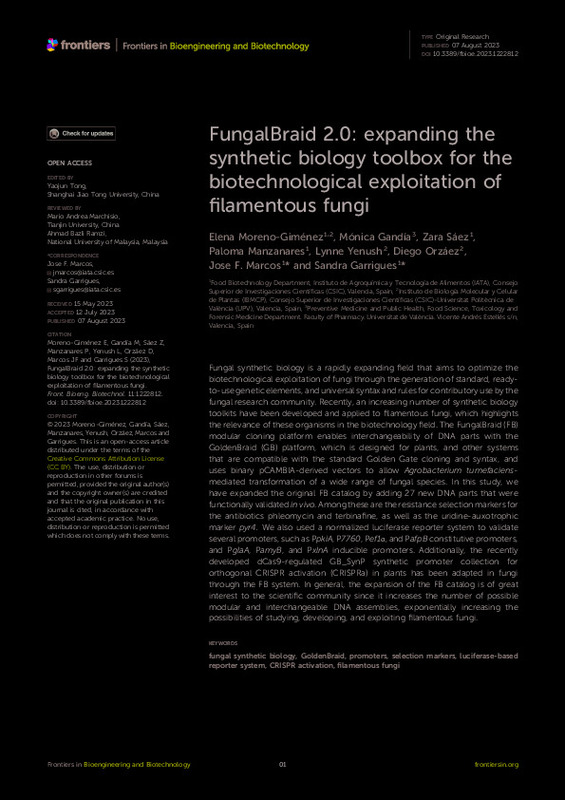JavaScript is disabled for your browser. Some features of this site may not work without it.
Buscar en RiuNet
Listar
Mi cuenta
Estadísticas
Ayuda RiuNet
Admin. UPV
FungalBraid 2.0: expanding the synthetic biology toolbox for the biotechnological exploitation of filamentous fungi
Mostrar el registro completo del ítem
Moreno-Giménez, E.; Gandía, M.; Sáez, Z.; Manzanares, P.; Yenush, L.; Orzáez Calatayud, DV.; Marcos, JF.... (2023). FungalBraid 2.0: expanding the synthetic biology toolbox for the biotechnological exploitation of filamentous fungi. Frontiers in Bioengineering and Biotechnology. 11:1-17. https://doi.org/10.3389/fbioe.2023.1222812
Por favor, use este identificador para citar o enlazar este ítem: http://hdl.handle.net/10251/201626
Ficheros en el ítem
Metadatos del ítem
| Título: | FungalBraid 2.0: expanding the synthetic biology toolbox for the biotechnological exploitation of filamentous fungi | |
| Autor: | Gandía, Mónica Sáez, Zara Manzanares, Paloma Marcos, Jose F. Garrigues, Sandra | |
| Entidad UPV: |
|
|
| Fecha difusión: |
|
|
| Resumen: |
[EN] Fungal synthetic biology is a rapidly expanding field that aims to optimize the biotechnological exploitation of fungi through the generation of standard, readyto-use genetic elements, and universal syntax and rules ...[+]
|
|
| Palabras clave: |
|
|
| Derechos de uso: | Reconocimiento (by) | |
| Fuente: |
|
|
| DOI: |
|
|
| Editorial: |
|
|
| Versión del editor: | https://doi.org/10.3389/fbioe.2023.1222812 | |
| Código del Proyecto: |
|
|
| Agradecimientos: |
This work was supported by PROMETEO/2018/066 from "Conselleria d'Educacio" (Generalitat Valenciana, Comunitat Valenciana, Spain), grant PID2021-125858OB-100, and the Severo Ochoa Excellence Program CEX 2021-001189-S funded ...[+]
|
|
| Tipo: |
|









